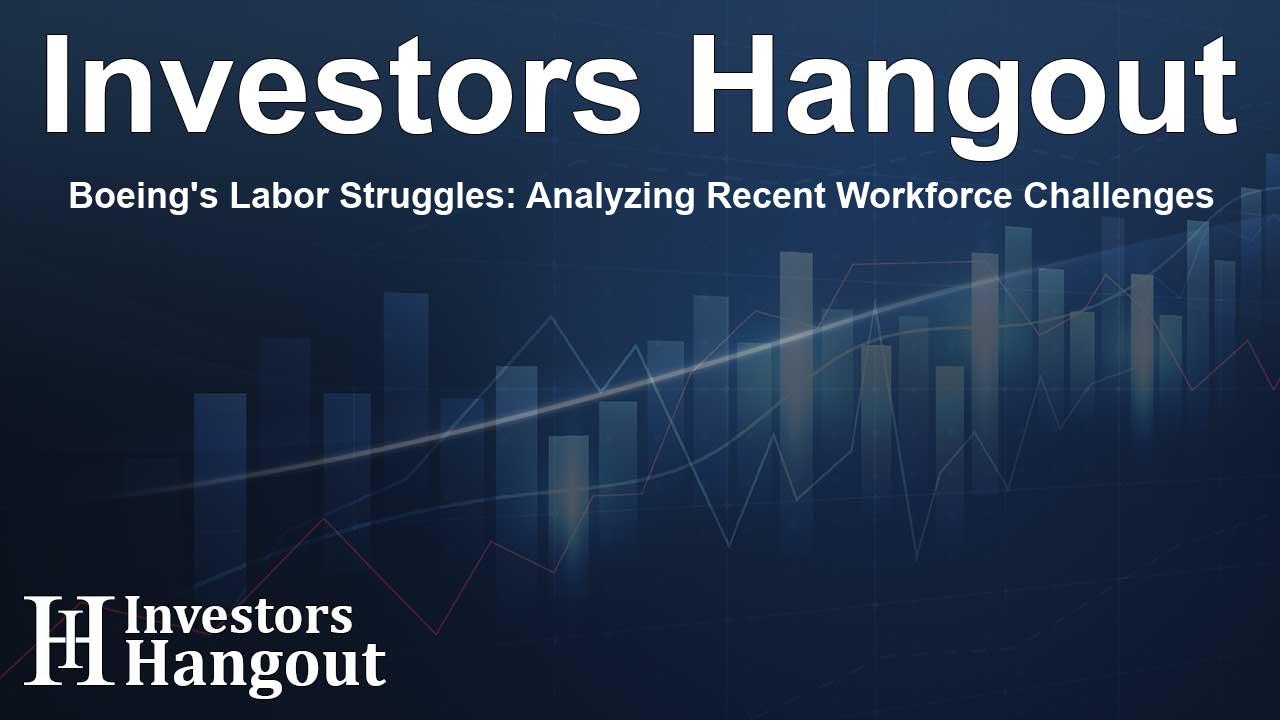Boeing's Labor Struggles: Analyzing Recent Workforce Challenges

Boeing Confronts Labor Challenges in the Aerospace Sector
Boeing (NYSE: BA) is currently facing significant labor unrest as 3,200 defense workers in a key location engage in a strike demanding better working conditions and improved contracts. While this dispute unfolds, the company is also reflecting on the painful lessons learned from its costly strike in 2024, which had a lasting impact on its finances.
The ongoing strike has now entered its third week, with defense workers insisting on better wages and benefits. Despite this turmoil, Boeing's stock has surprisingly performed well, gaining 27% year-to-date, showing resilience even in the face of operational disruptions.
This strike, involving the International Association of Machinists and Aerospace Workers (IAM) District 837, is a critical moment for Boeing’s leadership, which is still grappling with the ramifications of the 2024 machinists' strike. This earlier strike cost the company roughly $10 billion, leaving a significant mark on both its operational strategy and financial health.
Current Strike Status: Workers Demand Better Contracts
As the St. Louis defense workers continue their strike, they have effectively halted production of essential military aircraft, including the F-15 and F/A-18 fighters, as well as the T-7A trainer and the MQ-25 refueling drone. Unlike the larger 2024 strike that involved 33,000 workers, this one is more limited but remains significant due to its implications for defense contracts.
Earlier, Boeing proposed two contract offers that were rejected, the latest being an offer that included a 20% wage increase over four years and a $5,000 ratification bonus. Union leaders are advocating for terms more akin to a substantial previous agreement that secured a 38% wage increase over the same period, among other benefits.
In a sign of solidarity, local political leaders, including Democratic Representative Wesley Bell, have joined workers on the picket lines, bringing additional attention to their cause. Union officials have indicated that they are seeking quicker advancement to maximum wage scales and enhancements to retirement benefits as essential components of their demands.
Lessons from the 2024 Strike: Moving Forward
The strike in 2024 remains a painful memory for Boeing, highlighting the severe risks of labor disputes in the aerospace sector. This significant strike, which spanned around seven weeks, involved major disruptions in production and resulted in considerable financial losses for the company.
Initially sparked by a contract rejection in which 94.6% of workers voted against a deal that offered a 25% pay hike over four years, this strike proved how essential it is for Boeing to understand and meet worker expectations. The financial strain was substantial, with Boeing losing around $9.66 billion by the end of the conflict.
After this tumultuous period, Boeing learned the hard way about the importance of competitive offers and maintaining respectful negotiations with its workforce. However, the current strike reiterates that challenges remain present as the company continues seeking ways to balance operational needs with worker satisfaction.
Current Market and Stock Analysis for Boeing
As of now, Boeing's stock trades at about $232.40, reflecting the market's cautious optimism about the company's recovery amid several ongoing challenges. Its shares have risen remarkably in 2025, suggesting a vote of confidence from investors despite the backdrop of strikes and labor disputes.
Boeing's stock has exhibited notable volatility, with 52-week highs reaching $242.69 and lows at $128.88. While this fluctuating performance indicates a degree of uncertainty, it also showcases a rebound from previous lows related to earlier crises that impacted investor confidence.
The solid growth in stock price resonates with improvements made under CEO Kelly Ortberg’s guidance. Boeing’s second-quarter earnings demonstrate this, showing a revenue increase to $22.75 billion and reporting the highest airplane delivery count in recent years. Nevertheless, the ongoing labor unrest serves as a reminder that while strides have been made, a full recovery is still a complex endeavor for the company.
***
To stay informed and take charge of your trading day, consider subscribing to Bull Whisper, a daily newsletter designed to equip traders with essential market insights.
Frequently Asked Questions
What is the main issue with Boeing's defense workers?
Boeing's defense workers are on strike, demanding improved wages and benefits, impacting production of military aircraft.
How did Boeing's stock perform in 2025?
The stock gained 27% year-to-date, reflecting strong investor confidence despite labor challenges.
What were the consequences of the 2024 strike?
The 2024 strike cost Boeing approximately $10 billion, highlighting the financial risks of labor disputes.
What are Boeing's plans moving forward?
Boeing is focused on improving labor relations and ensuring competitive contract offers to prevent future strikes.
Why is investor confidence significant for Boeing?
Investor confidence is crucial for Boeing as it influences the stock price and the company's ability to recover from past challenges.
About The Author
Contact Dylan Bailey privately here. Or send an email with ATTN: Dylan Bailey as the subject to contact@investorshangout.com.
About Investors Hangout
Investors Hangout is a leading online stock forum for financial discussion and learning, offering a wide range of free tools and resources. It draws in traders of all levels, who exchange market knowledge, investigate trading tactics, and keep an eye on industry developments in real time. Featuring financial articles, stock message boards, quotes, charts, company profiles, and live news updates. Through cooperative learning and a wealth of informational resources, it helps users from novices creating their first portfolios to experts honing their techniques. Join Investors Hangout today: https://investorshangout.com/
The content of this article is based on factual, publicly available information and does not represent legal, financial, or investment advice. Investors Hangout does not offer financial advice, and the author is not a licensed financial advisor. Consult a qualified advisor before making any financial or investment decisions based on this article. This article should not be considered advice to purchase, sell, or hold any securities or other investments. If any of the material provided here is inaccurate, please contact us for corrections.
